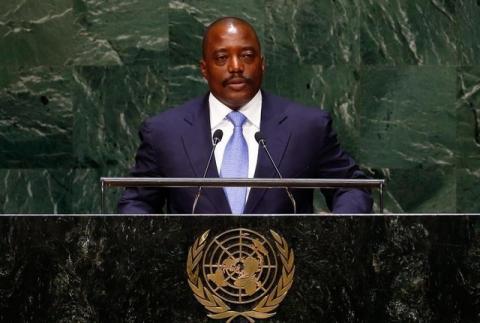Advertisement
Congo general strike stops most economic activity in capital
KINSHASA (Reuters) - A one-day general strike in Democratic Republic of Congo called to pressure President Joseph Kabila to quit power when his mandate ends in December paralyzed most economic activity in the capital on Tuesday.
Traffic on the normally bustling streets was greatly reduced, the shared taxis that ferry much of the city's workforce were not running and the central market was empty, witnesses said.
There was a heavy police presence in Kinshasa and the second city Lubumbashi, but no reports of violence.
"For us, this (strike) is an important action against an irresponsible government," said Abdul Mpia, 39.
By contrast, others said the strike was causing hardship in a city where many make a living as street sellers or market traders.
The constitution bars Kabila from standing for a third term at elections slated for November. He is yet to announce his plans but critics say they fear he wants to delay the poll to retain power or change the law so he can run.
Kabila came to power when his father was assassinated in 2001. He won elections in 2006 and 2011 that the opposition says were rigged. The duration of his tenure has raised tension in a country that has never known a peaceful handover of power. More than 40 died in a police crackdown on protests in January 2015.
Analysts said Tuesday's action alone was unlikely to have a decisive impact on government election plans, but opposition leaders say the strike is the first step in a broader protest movement.
In addition, the strike marks a retreat from the opposition's initial plan for protests, which they changed when the powerful Roman Catholic Church withdrew its support saying the event had become too politicized.
Kabila has appealed for a dialogue to help organize the elections. The opposition calls this a delaying tactic.
Police in the eastern city of Goma detained at least six pro-democracy activists overnight in a bid to undermine the strike, fellow activists said.
Six or seven members of the Struggle for Change (Lucha) group were detained around 4 a.m. (0200 GMT) in a private house as they prepared leaflets to distribute in support of the strike, Lucha member Luc Nkulula told Reuters.
There was no immediate comment from police or other authorities.
Embassies urged their citizens to exercise caution and U.S., French and Belgian schools in Kinshasa were closed.
The popular Radio France International station was off the air but authorities did not confirm the signal was cut. Broadcasts were cut during last year's political unrest.
(Additional reporting by Benoit Nyemba, Amedee Mwarabu Kiboko in Kinshasa and Kenny Katombe in Lubumbashi; Writing by Matthew Mpoke Bigg; Editing by Edward McAllister and Tom Miles)



















Add new comment